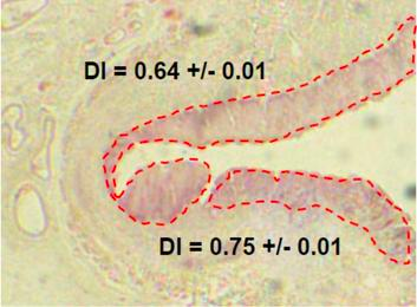A revolutionary breast cancer diagnostic technology could save the NHS £287m if widely adopted, a new study has found.
The independent health economic study, carried out by Health Tech Connect and commissioned and funded by the UK Government, concluded that the AI-powered tool would present huge savings in healthcare with much-lower acquisition costs, transportation fees, and a reduced prescription of chemotherapy, by as much as 30%.
And, if the tool was utilised for other areas of cancer across the NHS it would offer even greater savings.
Currently most breast cancer biopsy results are air freighted to the US for analysis at huge cost to the NHS – and the environment.
But the 40-page study found that Digistain’s technology eliminates this need, therefore reducing the NHS carbon footprint by 460 tonnes.
Digistain proves to be an optimal alternative to the currently-offered tumour profiling test, as it delivers non-inferior health outcomes while generating cost saving
Digistain has been inducted into the highly-selective NHS Innovation Accelerator programme – mandated to help transformative or impactful innovations spread throughout the NHS quickly.
Clinical data unveiled at the American Society of Clinical Oncology In Chicago last month showed that Digistain demo
The traditional H&E staining approach comes at a huge cost to the NHS as cancer biopsy results have to be flown to the US for analysis
Saving costs, improving care
The health economic study concluded: “The results indicate that the greatest cost savings can be achieved by offering Digistain as a substitute.
“Digistain proves to be an optimal alternative to the currently-offered tumour profiling test, as it delivers non-inferior health outcomes while generating cost saving.
“Implementing Digistain as a substitute for the current care would lead to improved health outcomes.”
The innovation also proves to be more cost-effective for post-menopausal women.
“The results indicate that Digistain can lead to statistically significant cumulative savings of an average of £286.7m for an intermediate-risk patient population once rolled out as a substitute”, says the report.
Digistain is currently being adopted around the world by hospitals in India, Thailand, Ecuador, Vietnam, Singapore, Malaysia, Myanmar, and Indonesia, with deals in the US and parts of Africa imminent.
The backlogs caused by the pandemic and industrial actions mean that fast-paced technology like this can really be the difference between life and death
It is also being trialled by a number of UK NHS trusts and has gained support from breast cancer survivor and patient advocate, actress Samantha Womack, who has called for its adoption by the NHS.
Sharaz Khan, NHS head of pathology at the Northampton General Hospital, which is an early adopter of Digistain, said: “Digistain cuts down wait times for results massively when compared to our current provider, who is sending samples to the US for analysis.
“The turnaround time with Digistain is much quicker, it is more accurate, and cheaper.
The difference between life and death
“The backlogs caused by the pandemic and industrial actions mean that fast-paced technology like this can really be the difference between life and death.
“I have worked for the National Health Service for 25 years and it is innovation like this that will open up a new digital pathway and frontier for the NHS – and help futureproof it.
“It can only be a matter of time before Digistain is adopted across the whole of the NHS.”
Digistain chief executive and clinical scientist Dr Hemmel Amrania, who invented the technology, added: “Digistain is at the forefront of rapid and cost-effective personalised cancer treatment decision-making.
I have worked for the National Health Service for 25 years and it is innovation like this that will open up a new digital pathway and frontier for the NHS – and help futureproof it
“This affordable new technology speeds up biopsy analysis where time and swift action are precious commodities.
“And this new and independent study demonstrates the significant economic and emissions savings that the NHS could achieve by adopting Digistain.
“This is a dynamic solution and one that speeds up the process, reducing anxiety for patients and cost.
“Ultimately, and most importantly, we hope Digistain can help to save many thousands of lives.”
The radical AI concept was developed at London’s Imperial College and Cancer Research UK laboratories under the guidance of decorated pathologist, Sir Nicholas Wright, and designed with input from 1,500 oncologists.
It has been successfully trialled with patients from the Nottingham University Hospital and London’s Charing Cross Hospital.
And last year, the company was awarded an Institute of Physics Business Start-Up award.
